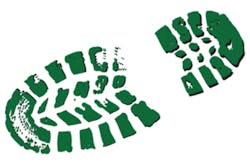EPA grant money to help with training for environmental & wastewater treatment jobs
LENEXA, Kan. — Dozens of underused or abandoned properties compromised by hazardous wastes or petroleum contamination in a 15-county area of northwest Missouri and northeast Kansas may be eligible for environmental redevelopment funding — and approximately 40 local residents will receive special training and placement assistance into environmental jobs — all as a result of $1.2 million in new Environmental Protection Agency (EPA) grants to the region, according to a press release.
The grants, including $1 million from EPA’s Brownfields Assessment, Revolving Loan Fund and Cleanup (ARC) competition, and $200,000 from EPA’s Environmental Workforce Development and Job Training (EWDJT) program, will be administered locally by the Mo-Kan Regional Council, of St. Joseph, Mo., noted the release.
“Through the good work of Mo-Kan, its staff and its partner agencies, these funds will have direct, profound and positive impact on communities in and around the Midland Empire,” EPA Region 7 Administrator Karl Brooks said. “Brownfields properties will be cleaned up and returned to productive use, and local residents will get job training and placement assistance in meaningful, sustainable environmental career positions.”
The $1 million Brownfields ARC grant will establish a revolving loan fund from which Mo-Kan will provide loans and subgrants to eligible entities to support cleanup activities, community engagement and cleanup planning. The grant includes $573,100 for work on properties affected by hazardous substances, and $426,900 for work on petroleum-contaminated properties.
The $200,000 Environmental Workforce Development and Job Training grant will allow Mo-Kan, working with its partners, to train approximately 40 low-income unemployed and underemployed individuals in environmental work, including 20 trained for environmental remediation, and 20 who will receive specialized training for wastewater treatment or collection systems operations. Mo-Kan’s goal is to place at least 30 program graduates in sustainable employment positions, working locally, stated the release.
